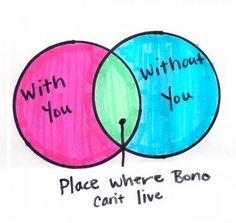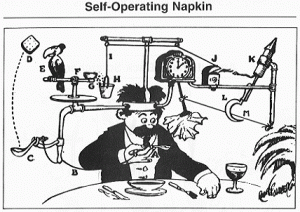Hey, I was interviewed by Josh Demarest
Beef Jerky, Rube Goldberg, & Writing
Josh Demarest very kindly interviewed me. His company provides all kinds of writing services, from web content to ghostwriting. I offered to host the interview here, so please also check out all of his services on his web site.
- Many writers claim that inspiration comes in waves of feast-or-famine, leaving them dry for days or weeks, and then coming back with more ideas than they can process. Others say that they don't have great lightbulb moments of clarity, but rather actively seek inspiration from their daily lives. Where would you place yourself on the scale from one extreme to the other?
 [emkap] Let’s see...if level one is daily grunt work and level ten is lightning-bolt-brain-flash, I’m about a seven average. I probably would have been higher, but my current project is bringing down my stats. Fantasy requires more brainstorming than mystery for me. I think I need a Venn diagram to see how the two overlap.
[emkap] Let’s see...if level one is daily grunt work and level ten is lightning-bolt-brain-flash, I’m about a seven average. I probably would have been higher, but my current project is bringing down my stats. Fantasy requires more brainstorming than mystery for me. I think I need a Venn diagram to see how the two overlap.
- What is your creative process, from raw idea to finished draft?
[emkap] My process is that I don’t really have a process. For most of my stories, I start with a central idea or a kernel. For Unmasked, it’s the concept of the Masks--faceless, emotionless mystics--in contrast or conflict with Mel’s character, which is wild, emotional, and difficult to contain. With that in mind, I start creating scenes in my head and on scratch paper. Then I stack those scenes together in an emotional progression like the arc of a five act play. I don’t formally outline stories, but if I get stuck, I try to think up a minor conflict or a scene that allows me to jump to the next. Like hopping on lilypads. In crocodile-infested waters.
- Writers are always talking about "mastering the craft." What does that mean to you, and is it the most important aspect of becoming a writer?
[emkap] “Mastering the craft” seems to imply there’s a level of achievement you can attain that makes you...I don’t know, golden. My writing changes with how I’m feeling, what I’m thinking, and what I’m experiencing (people, movies, other books, stubbing my toe, etc.). And that could be different for each person. I mean, after you get the basics of grammar and sprinkle in some cool vocabulary, how you manipulate your words to fit your thoughts is entirely personal. So, mastering the craft for me is like approaching infinity. I don’t want to stop changing and growing. Maybe that’s what people mean by it. In that case, yes, it’s pretty important. And I think I just talked myself into a circle.
- What was the first thing you remember writing for fun?

[emkap] I was about nine when I wrote a Swiss Family Robinson kind of adventure. It was about a family who lived in a tree house. A passel of kids and exotic animals. Lots of hijinks, Rube Goldberg devices, and a weird off-the-grid self-sufficiency.
- What are your best and worst writing habits?
[emkap] My best...I listen to my language during the first draft. I mean, I’m careful with word choice and sentence variety while I’m laying down scenes and mapping the plot. I know a lot of people don’t do that because it freezes them up. But I do...and it makes editing easier for me. I don’t recommend it though! Just write. Don’t worry about it. Maybe that’s my worst habit, too. No, I think my worst habit is eating beef jerky while I write. For some reason, I have to chew something. Gum doesn’t work. Water doesn’t work. Beef jerky is best.
- Do you find routine to be an inhibitor of inspiration or the gateway to good writing?
[emkap] I try to write at least thousand words a day. New words are best, but cleanup is fine, too. Just like eating well and exercising, writing by habit is really good for me. My dog knows within ten minutes if it’s dinner time. I think people aren’t as removed from domesticated house pets as we’d like to think we are. And Daylight Savings Time really messes me up.
- Every writer is inspired by other authors. Which ones inspire you, and how?
[emkap] Jill Shalvis, the romance writer, frequently posts pictures of her view on her Facebook page. Stupendous views of Lake Tahoe. That’s pretty darn inspiring. Living the dream maybe? I know it’s a rich and rare lifestyle--that’s not the part that makes me covetous--but she’s a down-to-earth person who writes palatable, easy-reading stories. People-pleasers. Yes, romance, but there’s something honest and sweet about them. What am I trying to say? She’s not Kafka. Not tearing out her hair over angst and canon. She’s just a person, doing her thing in her niche, and doing it well. I like that.
- Is there a real person behind Josie Tucker?
[emkap] Readers say that I’m Josie Tucker. That’s not entirely true. But I do know her character. Very well. I was chatting with Sunny Lu, the voice actor who did the audiobook for The Bride Wore Dead. She has some startling things in common with Josie, but I didn’t meet Sunny until long after the second book was done. Maybe there’s a little bit of grumpy Josie in a lot of us.
- UNMASKED. Wow. When you were creating the social strata of the Masks, was there a real-world group or figure that helped inspire you?
[emkap] Franciscan monks for the cloaks. Man, so cool. I think cloaks are really underrated. Did you ever see the movie version of The Name of The Rose? Sean Connery in a cloak. Double the cool. Or Friar Tuck, even, from the Robin Hood stories. I love the idea that behind the cloak and mask is a charming, vibrant personality. Or, in Mel’s case, a superhero Cinderella, as one reader said.
- You are, at least in my book, known for crafting believable, relatable secondary characters with legitimate desires and plot lines. Do you ever put people from your life into these roles? How do you make such compelling and complete characters?
[emkap] I love minor characters. This is probably DC sacrilege, but I’d rather be Robin than Batman. Reminds me of when I used to watch old movies with my father. Like The Maltese Falcon. We’d watch a scene and he’d say, “Ahh. Did you see Peter Lorre’s face in the background. Look at that!” So I learned to focus on things that weren’t necessarily in the foreground. I think that’s why 3D movies bug me. The background is out of focus. They’re telling you what to look at. When I write a scene, I want every character to have a fair chance at the spotlight. Like every person in the world, every character has a story.
- Your prose has won you as many compliments as your plots. How much editing do you have to do? And how do you approach the first draft, which in the words of Hemingway, is going to be shit?
 [emkap] My mom--whom I love very much--is a talker. I mean, a talker. Two-hour phone conversations until her phone battery dies. Anything and everything is fair game. From coupons to family stories she tells over and over until I memorized them at an early age. Growing up in an environment like that--where there’s little to no silence--I had to choose my words carefully. I needed the most firepower with the shortest lead time. Pithy and succinct. It wasn’t until later that I learned how to slow down and create more context, more buildup. Even now, my editing is to add things rather than delete them. First drafts are always forgivable. And forgiving. No one should see them but you. And even shit can be composted and turned into something fertile.
[emkap] My mom--whom I love very much--is a talker. I mean, a talker. Two-hour phone conversations until her phone battery dies. Anything and everything is fair game. From coupons to family stories she tells over and over until I memorized them at an early age. Growing up in an environment like that--where there’s little to no silence--I had to choose my words carefully. I needed the most firepower with the shortest lead time. Pithy and succinct. It wasn’t until later that I learned how to slow down and create more context, more buildup. Even now, my editing is to add things rather than delete them. First drafts are always forgivable. And forgiving. No one should see them but you. And even shit can be composted and turned into something fertile.
- You've done something very few authors have successfully done: crossed genres. What led you from the world of Josie Tucker into the dramatic landscape of Unmasked, and then back again?
[emkap] With me, the question might be more...what other genres do I write? I have a straight literary fiction manuscript. Some chick lit. A gumshoe noir. I wrote sci-fi and humor stories in college. I don’t know why I do it. I like variety, the opportunity to try on different hats. To be an actor in my own theater. I am my own Walter Mitty. It’s fun. Expansive for the mind. I guess to entertain myself most of all.
- If you had to give one piece of advice to young writers struggling to find their voice, what would it be?
[emkap] If you can’t find your voice, try someone else’s on for size. In doing so, you might find that your own emerges.
For more about Josh, visit http://joshuademarest.com/ or follow him on Twitter: @JDDemarest.Or feel free to visit me on Facebook or Twitter. I'm around.